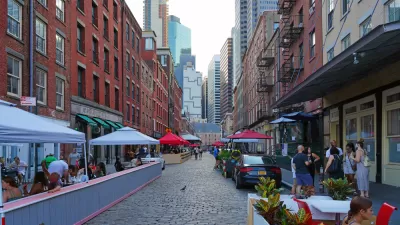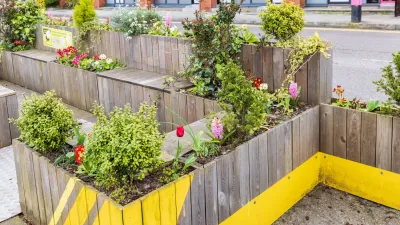Sustainable real estate developer, A-P Hurd asks some fundamental questions about the on-street parking in her Seattle neighborhood and concludes that residents should be able to do more than park cars with the spots in front of their homes.
Hurd writes, "Most of us in single family neighborhoods have a proprietary relationship with the street parking spot in front of their house. We think: "someone is parked in MY spot."
Generally speaking, the street space in front of homes is not owned by the homeowner - but that doesn't deter A-P Hurd, who is also a Runstad Fellow in the College of Built Environments at the University of Washington from exploring possibilities
Living on a narrow street, she asks, "Why is the city in the business of paving and maintaining three lanes of street when only one of them is actually moving cars?" (See her photo of her street in article).
Her next questions stem from the observation that 'curb lanes' are used for nothing but car storage, even when the homes may have driveways and carports or garages.
- "Why should local zoning require on-site parking when hardly any one is using their on-site parking for parking?"
- "The most interesting question: If we think on-site parking has better uses than parking, could we elect to use our street parking for better uses as well?"
- If the resident has "zero, or even one car per household, you're not really allowed to do anything else with that space, so you're losing out relative to your multi-car neighbors." Is that fair?
"Given that people do have this (proprietary) relationship with the parking spot in front of their house, what if we enabled them to do something other than park there? Some compact neighborhoods have taken to putting bike corrals or patios in parking spots..." (photos shown of Mission District parklet, San Francisco and Melrose Market Bike Corral, Seattle).
Hurd doesn't insist on parklets - she suggests 'monetizing' the parking, which is what "The High Price of Free Parking" author, Donald Shoup, defines as a Parking Benefit District. And technology has already jumped on this monetization - there's an 'app' for that.
Bottom line: "There is wasted space in the "parking" lanes of our single family neighborhoods. Let's build some frameworks that open up these spaces to human ingenuity, and see if we can't get more value out of them."
Hurd is also the "author of a recent book of practical strategies to get to better cities and stronger economies using less energy: The Carbon Efficient City."
Thanks to The Atlantic Cities newsletters
FULL STORY: That Parking Spot In Front of Your House Doesn't Belong to You

Alabama: Trump Terminates Settlements for Black Communities Harmed By Raw Sewage
Trump deemed the landmark civil rights agreement “illegal DEI and environmental justice policy.”

Study: Maui’s Plan to Convert Vacation Rentals to Long-Term Housing Could Cause Nearly $1 Billion Economic Loss
The plan would reduce visitor accommodation by 25% resulting in 1,900 jobs lost.

Planetizen Federal Action Tracker
A weekly monitor of how Trump’s orders and actions are impacting planners and planning in America.

Waymo Gets Permission to Map SF’s Market Street
If allowed to operate on the traffic-restricted street, Waymo’s autonomous taxis would have a leg up over ride-hailing competitors — and counter the city’s efforts to grow bike and pedestrian on the thoroughfare.

Parklet Symposium Highlights the Success of Shared Spaces
Parklets got a boost during the Covid-19 pandemic, when the concept was translated to outdoor dining programs that offered restaurants a lifeline during the shutdown.

Federal Homelessness Agency Places Entire Staff on Leave
The U.S. Interagency Council on Homelessness is the only federal agency dedicated to preventing and ending homelessness.
Urban Design for Planners 1: Software Tools
This six-course series explores essential urban design concepts using open source software and equips planners with the tools they need to participate fully in the urban design process.
Planning for Universal Design
Learn the tools for implementing Universal Design in planning regulations.
Caltrans
Smith Gee Studio
Institute for Housing and Urban Development Studies (IHS)
City of Grandview
Harvard GSD Executive Education
Toledo-Lucas County Plan Commissions
Salt Lake City
NYU Wagner Graduate School of Public Service





























